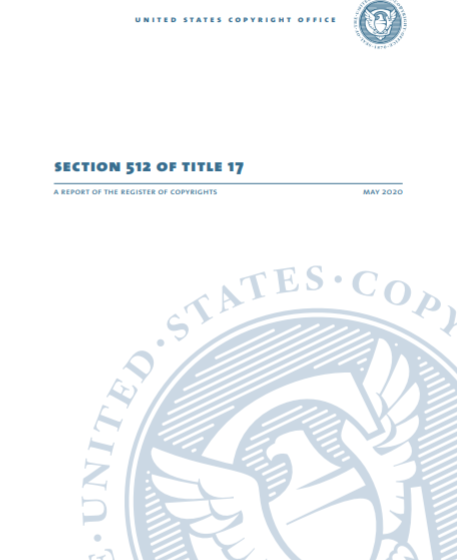Copyright Office: Notice & Takedown Online Regime Needs No Wholesale Changes
The smarter way to stay on top of the multichannel video marketplace. Sign up below.
You are now subscribed
Your newsletter sign-up was successful
The Copyright Office has released its long-awaited report on Sec. 512 of the Digital Millennium Copyright Act (DMCA) and has concluded that, while it needs re-balancing, that "notice and takedown" regime needs no wholesale changes.

The office points out that the report was the result of "a multi-year study resulting in two notices of inquiry, tens of thousands of written responses, nine empirical studies, and public roundtables in New York, San Francisco, and Washington, D.C."
Related: Copyright Office Recommends No Big Changes to Circumvention Prohibition Framework
The section, passed in 1998, created the system of limited liability safe harbor for online service providers in exchange for agreeing to a system for detecting and rectifying copyright infringements, the so-called "notice and takedown" regime
The report says that the safe harbor system is "unbalanced," saying it was out of sync with Congress' intent, including on "eligibility qualifications for the service provider safe harbors, repeat infringer policies, knowledge requirement standards, specificity within takedown notices, non-standard notice requirements, subpoenas, and injunctions."
It suggested Congress might want to "fine tune" it to better balance the "the rights and responsibilities of online service providers and rightsholders in the creative industries."
But wholesale changes, at least ones that fair use fans sought, were what some were looking for.
The smarter way to stay on top of the multichannel video marketplace. Sign up below.
“Today the U.S. Copyright Office released its long awaited Section 512 study," said Re-Create Coalition executive director Joshua Lamel. "Unfortunately, the Copyright Office mostly ignored the issues and arguments raised by consumer groups, tech platforms, libraries and others. While we are happy the report did not call for notice and stay down or siteblocking, the changes being suggested are not the ‘fine-tuning’ the Copyright Office suggests, but rather changes that will have a negative impact on the online creative ecosystem.
For example the report, argues that a court ruling could place liability on rightsholders for who fail to conduct a fair use inquiry before sending a takedown notice, even if the material was infringing. It suggested Congress monitor the fallout from that decision and adjust Sec. 512 as necessary.
"Despite the report’s original intent to ‘evaluate the impact and effectiveness of the DMCA safe harbor provisions,’ the Office has instead issued a report that only suggests changes that rightsholders asked for," said Lamel.
“The Motion Picture Association strongly commends the United States Copyright Office for its very thorough report on section 512 of the Digital Millennium Copyright Act (DMCA)," said Motion Picture Association chair Charles Rivkin.
“When Congress enacted the DMCA in 1998, it envisioned that section 512 would foster a collaborative environment that would ensure effective protections against online copyright theft. The Motion Picture Association agrees with the report’s conclusion that the DMCA ‘is not achieving the balance Congress originally intended’ and ‘fails to provide adequate protection of creators’ rights.’ Courts have interpreted Section 512 to expand the safe harbor in many ways Congress did not intend, and we look forward to exploring the Office’s suggestions."
Computers companies saw it as a mixed result.
“We are encouraged that the study recognizes wholesale changes to the notice and takedown system are not needed," said the Computer & Communications Industry Association president Matt Schruers. "Since the Office began this inquiry back in 2015, the entertainment industry boomed, led largely by Internet-enabled channels. In the current crisis, digital services that depend upon Section 512 have provided the public with valuable tools to connect, communicate, and gather information.
“It’s disappointing that the Office’s report says so little about fraudulent use of takedown demands to suppress speech, when it comes on the heels of a major Wall Street Journal investigation that uncovered serious cases of takedown abuse aimed at disappearing legitimate information from public view," added Schruers.
Contributing editor John Eggerton has been an editor and/or writer on media regulation, legislation and policy for over four decades, including covering the FCC, FTC, Congress, the major media trade associations, and the federal courts. In addition to Multichannel News and Broadcasting + Cable, his work has appeared in Radio World, TV Technology, TV Fax, This Week in Consumer Electronics, Variety and the Encyclopedia Britannica.

